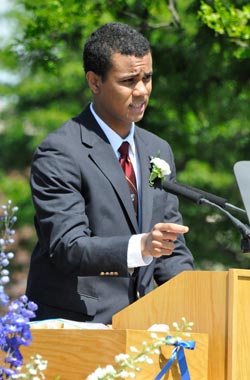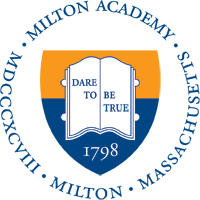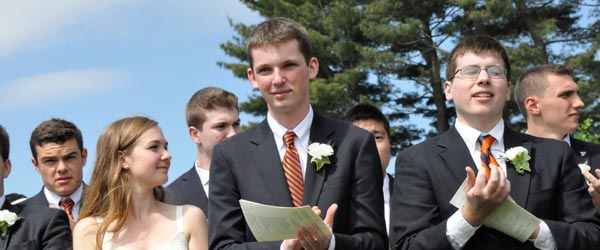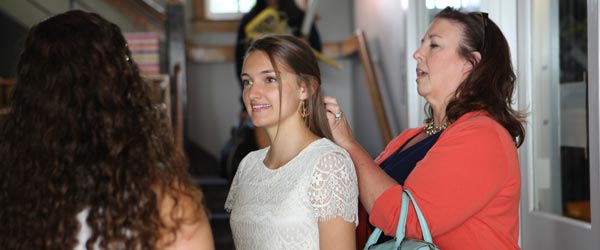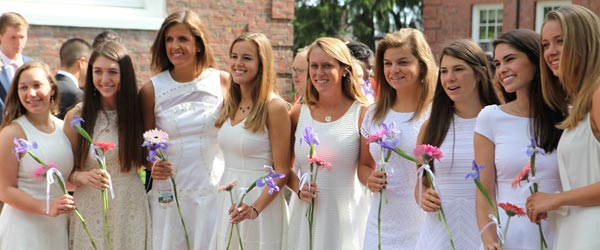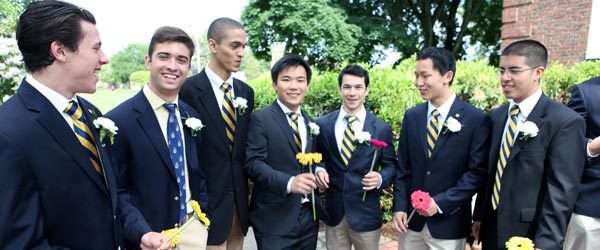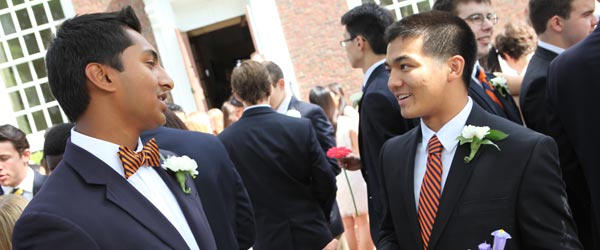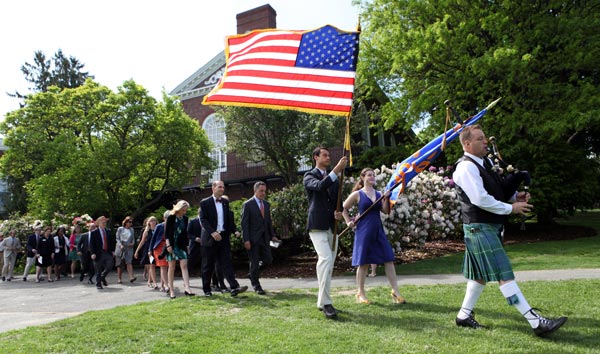Graduation 2014

“For last year’s words belong to last year’s language and next year’s words await another voice. And to make an end is to make a beginning.”
–T.S. Eliot, Class of 1906
Family, faculty and friends stood witness as 171 members of Milton Academy’s Class of 2014 made an end to their time at Milton during the School’s graduation exercises on Friday, June 6. As is tradition at Milton’s commencement, graduates and faculty were led by a bagpiper as they made their way from Straus Library to the ceremony on the quad. Following an invocation by Chaplain Suzanne DeBuhr and welcome by Head of School Todd Bland, student speakers, Sydney Park and Valentine Ora—elected by classmates to speak on their behalf—addressed the audience. Before receiving their diplomas, students also heard from this year’s graduate speaker, television and film producer Betsy Beers ’75.
Graduation Links
Class of 2014 graduates
Rachael Elizabeth Allen, Canton, MA
Emeline Noelle Atwood, Milton, MA
Theodore Alastair Bastian, Dover, MA
Ilve Naz Bayturk, Duxbury, MA
Jade Ly Beguelin, San Carlos, CA
Clay Reed Berger, Fort Lauderdale, FL
Daniel Toby Berman, Newton, MA
Olivia Rose Berman, Riverside, CT
Drew John Blake, Canton, MA
Gabriella Anne Blake, Hingham, MA
Emily Bingham Bland, Milton, MA
Mary Brereton Bland, Milton, MA
Charles Thomas Blasberg, Boston, MA
Rachelle Nicole Bower, Canton, MA
Alec Brennan, Weston, MA
Nathaniel David Bresnick, Sharon, MA
Eli FitzGerald Broderick, Vancouver, Canada
Peter James Broderick, Hingham, MA
John Andrew Cahill, Milton, MA
Rosamond Jewett Carr, Dedham, MA
Neil Yash Chandra, Sharon, MA
Jonathan Daniel Chang, Seoul, South Korea
Cin Yee Selina Cheah, Kuala Lumpur, Malaysia
Rebecca Elizabeth Chernick, Weston, MA
Daphne Jolie Chow, Brookline, MA
Matthew Chun, New York, NY
Tze Chen Chun, Hong Kong
Haley Anne Connor, Boston, MA
John Tyler Conway, Weston, MA
Robert Cody Bigelow Cortes, Cambridge, MA
Michael John Cronin III, Quincy, MA
Solana Rose Czwakiel, Milton, MA
Michael Robert Davis, Needham, MA
Duncan Bradford Day, Wrentham, MA
Miguel Morrison Day-Perez, Oviedo, Spain
Gerard Malcolm Denoeux, Oakland, ME
Haley Jean Dougherty, Smithtown, NY
James Atticus Dunn, North Attleboro, MA
Tapley Dane Eaton, Hamilton, MA
Ohiosumuan Chibuikem Ehimiaghe, Needham, MA
Mary Mayland Ellis, Gloucester, MA
Francesca Domenica Ely-Spence, Boston, MA
Katherine Farrington Fearey, Duxbury, MA
Angela Feng, Hong Kong
Yiqin Fu, Nanjing, China
Kaitlin Kim Gately, Hingham, MA
Stephanie Gina Gavell, Wayland, MA
John Vaughn Gilmore III, Sherborn, MA
Charlotte Woodruff Goddu, Boston, MA
Elana Rose Golub, Newton, MA
Shira Marie Golub, Newton, MA
Darcy Jordan Gopie, Boston, MA
Peter Julius Graves, Belmont, MA
Abigail Davis Greene, Dover, MA
Caitlin Ann Greene, Norwell, MA
Tiffany Kar Guan, Canton, MA
Jeremy Napolean Gunn, Hamden, CT
Katherine Kendall Hall, Milton, MA
Alexandria Elaine Hanyok, Raleigh, NC
Delaney Jean Harrop, Walpole, MA
Marina Gracie Hartnick, Newton, MA
Claire Olivia Hernon, Milton, MA
Zachary Manuel Hoffman, West Newton, MA
Morgan Melanie Hung, Hong Kong
Julia Pope Iansiti, Wellesley, MA
Joy Edeghonghon Ikekhua, Ikeja, Nigeria
Jesika Ananna Islam, Astoria, NY
Drew Tyler Jacobs, Marblehead, MA
Charles Burgess Janeway, Keene, NY
Kayla Pei Jang, South Pasadena, CA
Lindsey Megan Jay, Canton, MA
Nicholas Cheng-Wei Jiang, Norwell, MA
Austin Samuel Johnson, Chestnut Hill, MA
John Wallace Karle, Milton, MA
Christopher Erik Karlson, Dover, MA
Justin Ali Kennedy, Norwell, MA
Amy Elizabeth Kerr, Kingston, Jamaica
Riley Laura Kinney, Aspen, CO
Eleanor Margaret Kohli, Wellesley, MA
Ashley Soo Jin Koo, Old Tappan, NJ
Patryk Kazimierz Krzesaj, Brooklyn, NY
Anna Elizabeth Lachenauer, Weston, MA
Jennifer Michelle Lara, Jackson Heights, NY
Gwynne McConway Leavitt, Essex, MA
Abigail Leigh Lebovitz, Weston, MA
Alexander Kenneth Lee, East Walpole, MA
Jenna Yunsu Lee, New York, NY
Debbie Seung Hyun Lee, Seoul, Korea
Sung-Hyun Lee, Tokyo, Japan
Jessica Rose Levey, Westborough, MA
Sarah Cho Lew, Southport, CT
Rex Li, Nashua, NH
Jaspar Liang, Hong Kong
Derek Low, Queens, NY
Nathaniel Gordon Lundie, Wellesley, MA
Luke Beston Macdonald, Norwell, MA
Scott Frederick Majkowski, Chicago, IL
Ian Guilford Malone, Milton, MA
Alexander Cameron Mann, Nova Scotia, Canada
Alaina Elisabeth Marangos, Little Silver, NJ
Owen William Matthews, Milton, MA
Christopher Aynesworth McDonough, Milton, MA
Deirdre Jennings McGovern, Boxford, MA
Patrick Michael McLaughlin, Plymouth, MA
William Medina Jr., Lawrence, MA
Eric Joseph Menna, Dover, MA
Alexandrea Jane Meyer, San Francisco, CA
Margaret Anne Miller-Bartley, South Hampton, NH
Eleanor Jay Minot, South Hamilton, MA
Devon Laurel Moehlenkamp, Hingham, MA
Louisa Hopkins Moore, Cambridge, MA
Matthew Edward Morin, Raynham, MA
Sarah Valerie Muse, Milton, MA
Titania Thanh Nguyen, Milton, MA
Maura Kathleen Noone, Quincy, MA
Morgan Shaffer O’Connell, Hingham, MA
Titilayo Fiyinfoluwa Odedele, East Orange, NJ
Olamide Kolawole Olawuni, Jersey City, NJ
Catherine Calabresi Oldshue, Jamaica Plain, MA
Oluwayemisi Oluwakorede Olorunwunmi, Brockton, MA
Valentine Kenechi Ora, Boston, MA
Geoffrey Herrmann Owens, Boston, MA
Bartholomew Magner Panarese, Milton, MA
Cameron Young Park, Walpole, MA
Sydney Wallace Park, Walpole, MA
Victoria Ross Parker, Hingham, MA
Amanda Kathryn Pasko, Wellesley, MA
Peter Scott Pedersen, Far Hills, NJ
Rubye Dimitri Peyser, Milton, MA
Brendon Raymond Piccinni, Marblehead, MA
Geoffrey Hulme Pottow, Greenwich, CT
Samuel Ward Procter, Dover, MA
Howey Hou Qiu, Mystic, CT
Chandler Jean Quintin, Raynham, MA
Sahana Rao-Chakravorti, Brookline, MA
Shonnese Theresa Reid-Bailey, Boston, MA
Brandon Lucas Rodriguez, Chelsea, MA
Leidi Bethany Rodriguez, Boston, MA
Claire Virginia Russell, Milton, MA
Mykayla Lexi Sandler, Wayland, MA
Salima Sarsenova, Almaty, Kazakhstan
Olivia Francis Schuster, Singapore
Corey Jacob Schwaitzberg, Canton, MA
Anthony Michael Scurto, Wilmington, MA
Joshua Donghwan Seol, British Columbia, Canada
Patrick John Sheehan, Weymouth, MA
Garielle Cymbre Sinclair, Kingston, Jamaica
Varun Singh, Edison, NJ
Emily Karin Spencer, East Longmeadow, MA
Nathan Harrison Stanfield, Milton, MA
Samantha Kathryn Stultz, Kingston, Jamaica
Christopher Lawson Sutton, Canton, MA
Sean Michael Sylva, Raynham, MA
Helson Jose Taveras, Clifton, NJ
Helena Ruth Thatcher, Boston, MA
Nelson Dubois Lewis Thomas, Jamaica Plain, MA
Elizabeth Chapman Ticknor, Concord, MA
Carl Johan Unger, Danderyd, Sweden
John Patrick Urquhart, Bridgewater, MA
Daisy Eliza Walker, Milton, MA
Elizabeth Grace Walsh, Milton, MA
Madison Margaret Warwick, Hingham, MA
Eliza Ensign White, Wellesley, MA
Victoria Hope Saunders White, Stonington, CT
Liam Gabriel White, Wellesley, MA
Conner Patrick Wynne, Pomona, NY
Nadya Yeh, Hong Kong
Won-Tae Yoo, Seoul, South Korea
Eric Zhang, Palo Alto, CA
Catherine Bobbie Zhu, Mendham, NJ
Valentine Ora '14 Speech
Thank you, Mrs. Reiser. Thank you to Mr. Bloom, Mr. Bland, Mr. Ball, Mrs. Beers, Ms. Bonenfant, and Mr. Ruiz. Thank you to the faculty, the staff, the trustees, and to all the parents and family here today. And most of all, thank you to the Classy Class of 2014.
For as long as I can remember, I have considered myself a perfectionist. I guess it started during childhood. Any kid with foreign parents can probably relate: Going to a public elementary school, whenever I brought back a 98.5% on a test, I would receive an unimpressed stare, and a…
“But why isn’t it one HUNDRED percent?”
At that point, I would often go to my room and cry, ashamed of bringing dishonor to my family. The same philosophy would carry into my other passions. In my first-grade art class, we were once assigned to draw a pond. It was supposed to be a little project that would take about a week, but I made it into the single greatest challenge of my life. Each time, I started out by drawing the sun in the top right corner. If it wasn’t a perfect circle, I would crumple up the piece of paper and start over again. Sometimes I got pretty far. I would move past the sun and start on the pond, and if that was successful then I’d get to working on the surrounding trees and animals. One mistake, though, and it was back to circle one. At one point, I actually made it to the stage where I had the entire picture drawn out, and I was ready to start coloring it in. When I grabbed the best-blue-looking colored pencil and began shading the pond, I discovered, to my dismay, that it was actually too greenish for my taste. You fool! I thought, you picked turquoise blue over periwinkle blue!? Now you’ll never be the first half-black president! And so I crumpled up what was almost the perfect picture and started again, from scratch.
This obsession became a little unhealthy. I snuck the paper and colored pencils home so that I could keep working on my own schedule. My mother entered my room from time to time with a concerned expression:
“Honey, are you okay? Supper is ready…”
“I don’t need to eat! If I can’t even draw a pond setting, I don’t deserve food!”
“But are you sure? Your picture can wait…”
“Oh, Mommy. Young, naïve, Mommy. Do you think this picture will draw itself?”
“Okay, sweetie. Do you need any help?”
“No, Mom! I’m a lone wolf!”
With childlike hubris, I worked late into the night. I had to stay up until 9:30. I slaved away at that drawing. Was it stupid? Yes. Was it pointless? Yes. BUT… do I regret it? Yes. The day before the picture was due, my art teacher pulled me aside for an intervention.
“Valentine,” he said, “you’re singlehandedly destroying the environment. You’ve used up all my supplies and I had to go to the principal for a budget increase. Now, I’m going to give you one more piece of paper, and this will be your final draft. It doesn’t have to be perfect. This is a FIRST GRADE ART CLASS. I mean, some of your classmates still eat glue.”
So I took that sheet of paper with newfound serenity and got to work. When my hand would slip, I kept going. I didn’t pay heed to the flaws, but only concentrated on what was left to do. When I finally finished, it wasn’t a masterpiece. But my parents loved that picture for what it was, and they proudly hung it on the refrigerator door, flaws and all.
The moral of this story is best summed up by the great philosopher, Leo Tolstoy: “If you look for perfection, you’ll never be content.” As human beings, we have an unhealthy fixation on flawlessness, and hope, if not expect, that life will adhere to our overly idealistic plans. If you make it a concrete goal for something to be flawless, you’re only setting yourself up for failure. I had set out to draw the perfect picture, but what I failed to realize was that one can discover faults in any picture if he looks for them.
In the same way that life isn’t perfect, neither are any of us. I would be the first to say that I have my flaws. I mean, I would be the first, but everyone else has already beaten me to it – my friends, my teachers, every girl I’ve ever approached, my dentist, both of my parents… the list goes on and on.
You may then ask, how did I get to the point that I’m at now?
Hard work. Dedication. Ambition. These are things that, if I had had them, would’ve made my life a whole lot easier. I was never the perfect student in high school, but even so, I will still leave here today with a diploma… I hope.
Because none of us is perfect, let us be patient with one another. Let us be forgiving, merciful, and compassionate. If we do not support each other, we can never succeed.
Let us also learn to be patient and forgiving with ourselves. Don’t beat yourself up over your faults or mistakes, but instead seek to benefit yourself for the future. You’re magnificent, and you all deserve to think so.
Here at Milton, I was blessed to have been surrounded by a network of caring, compassionate students and faculty who have embraced and forgiven my imperfections. Of course, we may all be at different places next year, but one thing is for sure: No matter where we may go from here, we won’t necessarily have this same close-knit, loving, intimate community. Am I scared for the change? No! I’ve got ninety-nine problems but a switch ain’t one.
My foreign parents are probably thinking, “but why isn’t it one HUNDRED problems?” Oh, Mommy. Young, naïve, Mommy. That’s a question for another day. All I know is that this school is a special, special place.
My dear Class of 2014. Thank you very much for that enthusiasm, but what I was about to say was, Class of 2014, you’re NOT perfect. You’re not perfect, but you are the single most incredible bunch of people I’ve ever come across. Right now, you may have concrete plans. You envision a perfect next four years. Then, a perfect job. A perfect spouse. A perfect life. A perfect dentist. Allow me to be the first to warn you that you won’t find these. We will all have our ups and downs, but do not distress over the shortcomings, because through juxtaposition, they make the moments of victory all the more sweet. If life were perfect, it would be predictable. It would be pointless. It would be boring. Not everything will go according to plan, and not everything will be just right. “Okay”, you may wonder, “if I know that I can never be perfect, no matter what I do, where do I go from here?”
Well, just because we should learn to accept what we can’t change about ourselves doesn’t mean we shouldn’t strive to improve what we can. Acceptance is different from settling. Push yourself to new heights, but enjoy the ride on your way up. Balance self-satisfaction with unwavering ambition. Love who you are, but idolize who you could be.
To the Classy Class of 2014: Let your flaws keep you forever humble, but let your many strengths keep you incredibly confident. Perfection is overrated. The past wasn’t perfect, but that made us wise. The present isn’t perfect, but that keeps us busy. The future won’t be perfect, but that’ll keep things interesting. And we are not perfect, but that makes us each unique, irreplaceable, and worth celebrating.
By now, we’ve nearly graduated; I’m glad you made it. Mom and Dad, you waited, and act infatuated. We’re perfectly imperfect, but certainly it’s worth it. So don’t be scared to be you. Dare to be true.
Now that I’ve given the perfect speech, I just want to summarize that in life, nothing is perfect, and that is okay. After all, even our most flawed creations can make it to the refrigerator door. Thank you.
Sydney Park '14 Speech
Thank you Mr. Beauchemin. Thank you Mr. Bland, Mr. Bloom, Ms. Bonenfant, Mr. Ruiz, members of the board of trustees, members of the faculty and staff, friends and family, and special thanks to fellow Hathaway sister Ms. Beers. But the biggest thank you goes out to the Class of 2014.
We spend a lot of time thinking about the future. And why shouldn’t we? We’re rational and intelligent people, and planning for the future is a rational and intelligent thing to do. We make plans and we make choices because the future is a pretty scary thing, so planning for it makes it all a little less scary.
But I am tired of talking about the future. I am tired of planning and choosing, preparing and deciding. I’m tired of being expected to have an answer to every question. What are you going to major in? What are you doing for the rest of your life? When are you going to give me grandkids? Unfortunately, most commencement speeches are about the future, and that kind of stinks because when I sat down to write my speech, I thought I had nothing to say. That is until I passed two fat squirrels sitting on a trashcan on my way back to Hathaway. And these two morbidly obese rodents made me think of a fact that I read about, these small mammals, something one would remember should she ever encounter a fact about squirrels. Squirrels, on average, forget where 74% of their acorns are buried. Squirrels are pretty dumb. If a squirrel can forget where they’ve put their main source of sustenance imagine what else they forget. Yet people have memories that can span years. We can remember our first kiss, our last middle school dance, the best or the most mediocre vacation we’ve ever taken, that trip when my twin Cameron and I got lost in the woods with sheep. (Thanks, Mom and Dad.) We can remember the good, the bad, the ugly, the heartwarming, and the heartbreaking. Our memory is amazing. So before heading off into the uncertain future, let’s talk about memory and why it’s so valuable and important.
Memory is a funny thing. The moment remains the same, the memory is what happened, but our perception of it changes, and that perspective can positively affect us. Something embarrassing and humiliating in the moment can be hilarious—and humiliating—to think back on. Something heart-wrenching and devastating can be enlightening and strengthening in hindsight. Our memories can teach us, comfort us, or remind us where we left our wallet. A squirrel can’t even remember where he’s buried his acorns, but we as people cannot only remember, we can be positively affected by those experiences. That is pretty gosh darn spectacular.
The study of human history draws on that same idea of learning from the past. I’m going to pull a Mr. Ball here and throw a little hardcore history your way because nothing illustrates a point better than taking a long circuitous route through ancient civilization. Herodotus of Halicarnassus, a Greek historian who lived in the fifth century BCE, is widely regarded as the Father of History. But Herodotus was much more a storyteller than a historian. He drew on the Ionian tradition of recording history, a method that involved collecting lots of bits of tall tales and peoples’ memories, tying them together and presenting them. History, in Ionian terms, is largely just a lot of memories, a journal of the Greek population riddled with myth and legend, much like the diary I kept as a little girl, filled with gossip, betrayal and first grade angst. The histories of Herodotus beg the question of why write these memories down anyway? Why did he think they were worth preserving? What value could they possibly hold? And the answer is simple: We can learn and grow from our memories, our stories, and those of others.
Our memories help to define who we are, and for a lot of us, many of those memories have been made right here at Milton. No matter how far away you go, whether it’s across the country or right down the street, Milton, and the people you’ve met here, will always be a part of you, and I think that’s really comforting. We have learned from the classes we have taken and the extracurriculars we’ve been a part of. But, most importantly, we’ve learned from the people we’ve met here. Remember these people, because we have not only learned from them, we can find support in them. Remember that teacher who taught us to speak up. Remember that student who said hello to us to every day without fail. Remember your awesome and incredible twin. Remember your best friends, your teammates, your upper and underclassmen sisters and brothers. The memories from Milton that you share with these people will comfort you in an uncertain present and unpredictable future. It’s a warm and fuzzy notion, but as a rather warm and fuzzy person, I’d like to think memory is more than just an academic idea.
You are all intelligent and rational people. You wouldn’t go to Milton, send your kids to Milton or teach at Milton if you were anything but. So don’t be dumb. Don’t be squirrels. Remember your nuts. Believe that memories are worth something, and go out and make some. Go swim with dolphins, be traumatized by them, and then give a five-minute senior talk and relive that traumatization, like I did. Thanks, Mom and Dad. Take life by the dorsal fin and do stuff worth remembering.
Class of 2014, it’s crazy to think that today, we’re graduating. Possible? Probably? Already happening. You are some of my closest friends, and I hope that wherever you end up you will remember all that we have done together and cherish the memories you have made here. We have this glorious gift of memory, so take advantage of it. While I implore you to remember your time here, we can’t live in the past forever. Get excited about what lies ahead. Go, be adventurous. Take on that unpredictable future with the belief that something worth remembering will come out of that leap of faith. Be courageous with the expectation that something good will happen—something you’ll want to remember.
Class of 2014, keep your memories and your stories close to your heart as you tackle the future with confidence. And rest assured knowing that you are all smarter than squirrels.
Betsy Beers '75 Speech
Thank you for that introduction. I am incredibly thrilled to be back at Milton. Things have really changed. In my day, the school was called Coordinate, which meant the girls were kept down the street at Hathaway and Goodwin, and the boys were stored on the main quad. Centre Street was kind of like a chastity belt. But the only REAL co-ed part of the campus was the graveyard!
I am extremely honored, and frankly appalled, you guys chose me to give this address. As a matter of fact, when I got the call, I suspected it was a practical joke. We have an actor on Scandal, Josh Malina, who loves to figure out ways of humiliating us and then Tweeting about it. But it turned out this was the real thing. So I hung up the phone and did what any red-blooded Los Angelean in the film and television business would do. I called my shrink. I was terrified. What vague wisdom did I have to share with these bright young minds, I asked her? And no surprise, she tried to be really upbeat, and we both agreed it might not be good to dwell on the 25 years I had been in damn-it-to-hell, freaking therapy. Oh, and she recommended that I keep the swearing to a minimum.
So next I asked my husband: Why in God’s name should I do this? He was very encouraging, as he loves Craigie On Main so he figured he would at least eat well. And, he mentioned that I might want to clean my mouth up. I asked my former comedy partner, later boyfriend, later ex-husband, now friend, and he, always the renegade, told me to share my experiences and swear as much as possible.
Okay, you are all picking up on a theme, I suspect. One of the things I am well known for in my industry is my ability to make foul language fun. I am like the Sesame Street of obscenities. And I just want to make it clear where I discovered my gift of creative expression. Right here. At Milton. That’s right. I dared to be Blue!
Sure, I gained a lasting appreciation of the novel from John Charles Smith and the glories of modern art from Ms. Bush, but drama teacher Marty Lafferty taught me how to swear. Marty was crazy and creative and fully inappropriate and not fit for high school. He tried to teach us an appreciation for the classic works of theatre. I have that to this day, but I also got this added bonus. The guy was a truly inventive swearer and is an unexpected inspiration in later years. Now that is what I call liberal arts!
I guess the point is, my time at Milton has made me equal parts hard-working good girl and foul-mouthed troublemaker. So, as I try to say something meaningful to all of you, I will attempt to steer a course somewhere between boring and outrageous without making the damned thing too long. Graduates, here it goes:
FIVE BIG THINGS I HAVE LEARNED SINCE I GRADUATED FROM MILTON:
NUMBER ONE: YOU ALWAYS WILL LEARN MORE DOING A CRAP JOB THAN A GREAT ONE.
At some point, either wait on tables, fold clothes at the Gap, or be a lowly assistant. Ha! Not what you guys expected to hear, right? Trust me, this is going somewhere. I left Milton and went off to college where I continued to study acting. After moving to New York City after graduation, I made the transition to comedy and commercial work, which didn’t pay all the bills. As a result, I did everything from dress up like a china doll in a very smelly 1890’s costume at a department store to licking envelopes for an angry nonprofit group to waitressing at a place famous for—wait for it—fondue. Take waiting on tables: You see people at their best and their worst, and you have to learn to negotiate between a hungry and anxious public and a bi-polar guy in the kitchen who gets to wield knives as part of his job. I have watched a grown man cry when he didn’t get his ketchup. A dude in a suit. Seriously. Ten tables, all seated at once, all hungry? To this day, I still have a nightmare that I come back to a station and all the customers are dead. So why is this important? Because waiting on tables is more than a crap job. It is making order out of chaos. It is delivering something important with your own hands, on time and with a smile on your face. It’s keeping colleagues from killing each other and keeping your cool. In other words, it is a lot like producing a major network television show. And, by the way, I learned that the quickest way to discover if you want to do business with someone is to watch how they treat a stranger who is just trying to get them fed. I have literally not worked for, or hired, certain people after watching them berate an underling. Once you have sat on that side of the proverbial desk, it will change the way you think of those who are working around you. By the way, if you have already had to experience any of the above, feel good that those years of scooping ice cream will pay off.
NUMBER TWO: DOING WHAT YOU LOVE WILL NEVER BE A WASTE OF TIME.
Even if you set out with one career passion in mind, and then change course, I guarantee that what ever you learned previously will be useful. I got to Hollywood and, despite my attempts to be the next Lucille Ball, it wasn’t to be. But when the opportunity to work at the lowest level of the film development and production business emerged, I figured I would try it, and if I didn’t miss acting, it was meant to be. I never turned back, and, trust me, you all are the better for it. However, the acting training served me well in my new career. I got jobs initially because I was more entertaining than the average executive, and as an actor I learned how to listen and read a room. I gave up acting, only to act every day of my life in my new career.
And it isn’t just me. A couple of other examples: Shonda Rhimes, my producing partner and genius writer, almost went to medical school before deciding to write for a living. When we were trying to come up with a concept for a new show, that interest spurred her to create Grey’s Anatomy. And I recently met a writer who used to work as a dominatrix before staffing in television. She says that her old skill set comes in handy all the time. I will take her at her word.
NUMBER THREE: DON’T BE SCARED TO ADMIT YOU DON’T HAVE A FREAKING CLUE WHAT YOU ARE DOING.
I worked my way up and worked finding movie ideas and scripts for other producers for about eight years, and finally I got to produce my first movie, which was called 200 Cigarettes. I was stranded on the streets of Manhattan with a rotating cast of young actors, shooting all nights for 35 days with about three dollars and ninety-five cents to make the damned thing. I started off by trying to pretend I had a clue. Here is a tip: Pretending you have a clue does not go over well on the streets of New York with crews who have been doing this since before you were born and some of whom might, or might not, be part of a crime syndicate. And let’s face it. I can’t drive a truck, or do hair and makeup, or even understand what all those lenses are for when they shoot the thing. The difference between me surviving, or ending up in a rubber room, was my learned ability to go up to pretty much everyone and ask for help. People like to be asked for help. It is a sign of respect and strength. Look, I had no idea how to give one of these damned speeches and the only reason any words are coming out of my mouth is cause I spoke to some of you graduates, who tried to give me guidance.
NUMBER FOUR: CHOOSE PASSION, NOT FEAR.
Okay. There are both in this world, and fear is often the easier emotion to access. But, passion? It is the key to clarity and good work.
For about twelve years, I worked at producing movies. Every movie I worked on tanked. Totally bombed. An example: Does anyone remember a movie called No Escape? About a penal colony in futuristic Australia? I rest my case. I couldn’t figure it out. Some were good movies, which I genuinely liked, despite the fact that they often had been assigned to me. But mainly, we spent time at work being sent out to imitate successful films. Everyone seemed afraid to take a risk. I also found I didn’t go out to watch current movies much as they were a reminder that I couldn’t crack the code.
But I had a secret. I watched television. It wasn’t fashionable then. It was considered the lower art, like pro-wrestling. All the cool people worked in movies, where you spent tons of money and met movie stars. (To this day, if you watch the Golden Globes award show, they make the television nominees sit in the back of the proverbial Hollywood classroom and the movie stars sit up front.)
I loved television—from the first episode of Mary Tyler Moore that I watched babysitting, eating Kit Kat bars, to Cheers to Twin Peaks to the fantastically terrible T.J. Hooker. But it was what I loved to watch—not what I was supposed to be doing for a living.
Then an amazing thing happened. I got the opportunity to pitch hour dramatic television shows to the networks. And during that time, I met an incredible movie writer who was also obsessed with television and pop culture, and, like me, loved songs from the eighties and binge-watched America’s Next Top Model.
Grey’s Anatomy came from a simple, emotional place. Shonda and I both wanted to see a show on television that reflected our lives. We were two strong, competitive women with dark and twisty centers who did virtually nothing but work, who had complicated love lives and messy relationships with a diverse group of friends who were as screwed up as we were. So even though we had never produced a television show, we just made up the rules as we went along. And my fear of failure went away, because I was so passionate about the show she had created.
NUMBER FIVE: NICE GUYS DON’T FINISH LAST.
It is a popular notion that, in my business (and probably in many businesses), you have to be a rabid, backstabbing animal to succeed. These are the folks who, even after the menial job kept them humble and focused, get their first taste of success and become total jerks. We have our share of them, certainly. I have watched famous actors make set hairdressers cry when they didn’t like the way they looked, or a well-known producer throw furniture at an employee that was barely making a living wage. The scientific term for these people is “asshole.” And yes, I walk through the Valley of Assholes every day. These people are bullies. And bullies are frightened people. They are not happy people. At all. I am here to tell you that you can have a conscience and treat your co-workers decently and honestly and still become a success. For every phone thrower out there, there is someone like Kerry Washington, who actually buys cupcakes for the crew to thank them when she wins an award. You can still stand up for the little guy, ask for help, listen to people, and not lie like a rug, and you will do just fine. In fact, we have a policy at Shondaland, which is actually called The No Assholes Hiring Policy. Zero tolerance of jerkdom. It hasn’t hurt our business yet, and we hope it is catching on.
So that is what I have for you. I raise an extra large iced coffee to the class of 2014! Congratulations! Now go out and make your own five things. You have received the best academic and humane preparation here available, and thus, you are walking into a world with a huge advantage. Use your power wisely, and fear sparingly, and your curiosity enthusiastically. And never lose your sense of humor. You wont regret it, I swear. Thank you.
Betsy Beers ’75, Executive Producer,
Grey’s Anatomy and Scandal
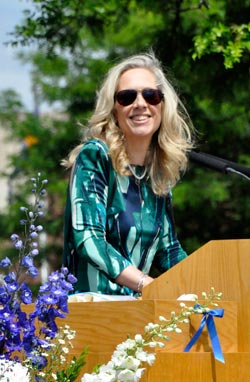
Todd Bland, Head of School
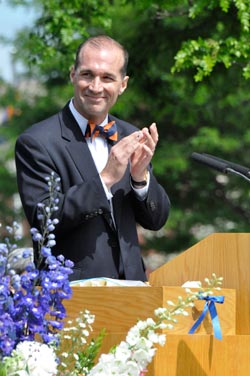
Sydney Park ’14
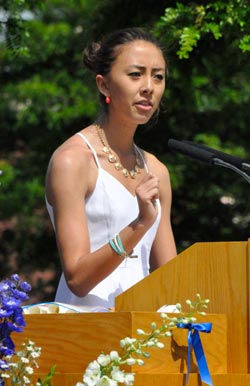
Valentine Ora ’14
